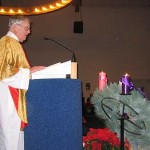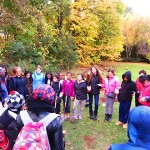I Am Somebody
The words of today’s gospel telling us not to worry about what we are to eat or what we are to wear or anything else are easy for me to preach about. I’m assured of a roof over my head, a bed and three meals a day. But what about the man or woman on welfare, what about the single mother or the family who depend of food banks, what about the person who can’t find work, what about the man or woman who worry about job security, what about the elderly who worry whether or not their pension plan will support them in their old age?
Today’s gospel speaks to a truth far beyond our present life situations, whether we are well off, comfortable or as is the case of most of the people in the world, struggling to survive.
Jesus is telling us something we need to know but a truth we often find hard to trust.
In the eyes of God we are loved, we are precious and we are important. We are more than a statistic, more than a commodity, more than a consumer or client. As the old chant called us to remember, ‘I am somebody.’ We are all a loved son or daughter of God and we are all a brother or a sister of Jesus Christ, who loved us and died he painful, humiliating death on the cross to bring us back to God. This is the basic truth of our lives, we all are somebody.
At times our life situation, poverty, unemployment, addiction, divorce, chronic illness, the death of someone we dearly loved can and does make us doubt this truth.
Listen again to the words of Isaiah; “Can a woman forget her nursing child or show no compassion to the child of her womb”? Yes she can and yes she does. We are shocked when we hear of read about a child who dies of beatings and neglect or an infant who dies of malnourishment. These crimes do happen even if rarely, but they are incomprehensible. How could a mother treat her infant in such a way?
The men and women who listened to these words of Jesus were people who lived just above what we call today, the poverty line. They lived from day to day, from hand to mouth. A crop failure or a disease among their sheep or goats could leave them with little or nothing to live on. They were totally absorbed in the challenge of living from moment to moment. They needed to hear these encouraging words of Jesus telling them of their own worth and dignity, telling them they are precious to God
Like the men and women of old we too need to hear that we more than a number or statistic. We need to hear that God know each one of us as a loved, a treasured son or daughter. We need to hear that Jesus loves each of us as a brother or sister.
Food and drink, employment, health and housing these are important realities in all lives but far more important is our relationship with God and how our lives are open to God. What does it profit us if we have everything we could ever wish for at the cost of losing our friendship with God?
As we continue to celebrate this Mass we pray for ourselves and for each other that we always remember the truth, I am somebody, I am a son or daughter of God who chose me before the world began. I am a brother or sister of Christ, who loved me and died on the cross for me.
I am somebody.
 Founded by St. Paul of the Cross, every Passionist takes a special vow to spend his or her energies in promoting remembrance of the sufferings of Jesus, the memory of the Cross, and reflection of the meaning of the Cross for the world.
Founded by St. Paul of the Cross, every Passionist takes a special vow to spend his or her energies in promoting remembrance of the sufferings of Jesus, the memory of the Cross, and reflection of the meaning of the Cross for the world.




